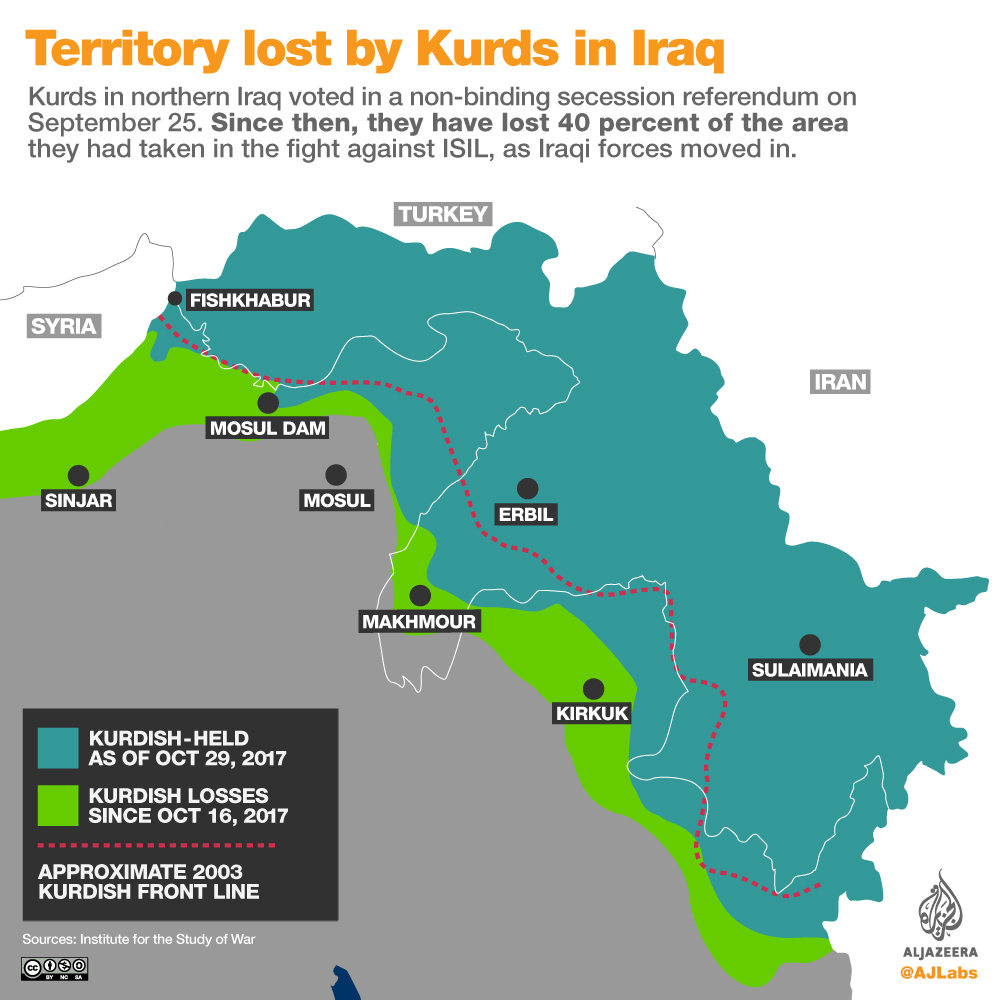Baghdad court rules secession attempt unconstitutional
Following Kurds’ referendum Supreme Federal Court says national charter calls for preservation of territorial integrity.

Iraq’s top court has said the country’s constitution does not allow for the secession of any part of the country from the state.
In a statement on Monday, Iyas al-Samouk, Supreme Federal Court spokesperson, said the national charter expressly calls for the preservation of Iraq’s unity and territorial integrity.
Keep reading
list of 4 itemsTurkey hits 71 targets in Iraq, Syria in retaliation for soldiers’ deaths
Turkey says bombers came from Syria, threatens more cross-border strikes
‘Iraqis love life’: In conversation with Ala Talabani
The court is responsible for settling disputes between the central government in Baghdad and the country’s regions and provinces, including northern Iraq’s semi-autonomous Kurdish region.
The court’s rulings are final and cannot be contested by higher judicial authorities.
On September 25, people in the semi-autonomous Kurdish region of northern Iraq and a number of disputed areas under the control of the Kurdish Regional Government (KRG) voted in a controversial referendum that found overwhelming support for secession.
The referendum, which was declared illegal by the federal government in Baghdad and criticised by neighbouring countries, resulted in 92 percent of people voting in favour of splitting from Iraq.
|
|
The poll was heavily criticised at the time by most regional and international actors, with many warning that it would distract from Iraq’s ongoing fight against terrorism and further destabilise the region.
Less than a month later, Kurds found themselves without about 40 percent of the territory they previously held as they withdrew from disputed areas.
In a rapid advance, Iraqi forces took full control of Kirkuk, which Kurdish Peshmerga fighters had seized after the Iraqi army fled a major offensive by the Islamic State of Iraq and the Levant (ISIL, also known as ISIS) group in 2014.
Following Monday’s verdict, Haider al-Abadi called on all parties to “totally abide by the constitution and all Federal Court decisions”.
“We call on the region to clearly state its commitment to non-separation or independence [of any province or sub-region] from Iraq,” a statement from the Iraqi prime minister’s office said.
Budget controversy
Separately, KRG cabinet ministers have dismissed the drafting of Iraq’s 2018 budget without Kurdish participation as a violation of the constitution and the country’s financial laws, and appealed to the federal government to give the region its fair share.
In a four-point statement on Sunday, the KRG condemned the reduction of its share of the federal budget from 17 percent to 12.6 percent as a violation of “section 3 of Article 121 of the constitution”.
Earlier in the day, Iraq’s cabinet proposed to reduce the Kurdish share of the country’s revenue in the 2018 federal budget, a move seen as aimed to further punish the Kurds for the secession referendum.
A preliminary draft document pointed to a reduction in Kurdistan’s share of the 2018 budget from the 17 percent the region has traditionally been entitled to since the fall of longstanding Iraqi ruler Saddam Hussein.
KRG officials have long maintained that the Baghdad government never sent Iraqi Kurdistan its full 17 percent in the past.
In recent days the Abadi government has also hinted that it will start dealing with the Kurdistan as separate provinces and give them their share of the national budget individually, which the Kurds consider as an attempt to dismantle the KRG as an autonomous region.
